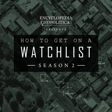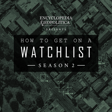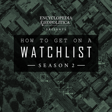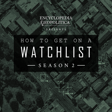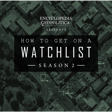Podcast Introduction and Host Backgrounds
00:00:06
Speaker
Welcome to How to Get on a Watchlist, the new podcast series from Encyclopedia Geopolitica. In each episode, we sit down with leading experts to talk about dangerous acts, organisations and people. We examine historical cases, as well as the risks these subjects currently pose. From assassinations and airline shootdowns, through to kidnappings and coups, we'll examine each of these threats through the lenses of both the dangerous actors behind them and the agencies around the world seeking to stop them.
00:00:38
Speaker
In the interest of operational security, certain tactical details will be omitted from these discussions. However, the cases and threats which we discuss here are very real.
00:01:07
Speaker
I'm Louis H. Passant, the founder and editor of Encyclopedia Geopolitica. I'm also a doctoral researcher at the University of Loughborough in the field of intelligence and espionage in the private sector. In my day job, I provide intelligence to corporate executives on complex geopolitical and security issues. So I'm joined today by Fred Burton. Fred is one of the world's foremost authorities on protective intelligence, security and counterterrorism. As executive director of the ONTIC Center for Protective Intelligence, Fred spearheads strategic consulting to physical security leaders at major corporations.
00:01:37
Speaker
advising them on how to keep their people safe. Fred's also a former counterterrorism special agent and New York Times bestselling author. He's been referred to as the father of protective intelligence in the diplomatic security service. And I can't imagine there are many people out there who know as much about this topic as Fred. So Fred, thank you very much for joining us. Thank you for having me, Lewis. Although I might say I'm probably viewed as the grandfather now instead of the father of protective intelligence. Well, I think let's just hope that means it speaks to your wisdom more than anything on this topic.
Assassinations and Protective Intelligence Origins
00:02:08
Speaker
So today we're talking about the topic, rather gruesome topic as is usual for this podcast, how to assassinate a diplomat. And unfortunately this is quite a timely discussion as at the time of recording it's hot off the heels of the assassination of Japanese Prime Minister Shinzo Abe, which I'm sure we'll discuss during today's show. But before we get into that, Fred,
00:02:29
Speaker
Over your incredible career and the birth of protective intelligence in diplomatic security, you talk about this in your book, Ghost, which I thoroughly enjoyed. We'll make sure there's a link in the show notes for our listeners to give a read to. But tell us in your own words, how did you get into this line of work? And in particular, what made you realize the need for intelligence when it comes to protecting diplomats?
00:02:53
Speaker
Yeah, it's a great question, Lewis. And you know, the older you get, you kind of reflect back on how did you get here. And I think that as I look back over the course of my career, there were a couple pivotal moments. One was clearly the 1973
00:03:11
Speaker
political assassination of an Israeli diplomat in my neighborhood when I was growing up. And it was a case that had gone cold, and literally the Black September organization had been behind the hit, and they were of Munich fame, which I'm sure many of your listeners would know. And when I became a special agent with the State Department and the Counterterrorism Division,
00:03:36
Speaker
It struck me as I started looking through some of these cases, predominantly from the 70s. So for example, you know, we had horrific murders of our diplomats in Khartoum, Sudan, Beirut in 79, and then of course the embassy bombings in 83 and 84, and all of these were
00:03:55
Speaker
in many ways my cold cases. So I started looking into how these attacks take place and it dawned on me that the threat actors, the terrorists, the assassins that were behind these plots had to go about watching
00:04:11
Speaker
and studying and figuring out the security vulnerabilities and taking advantage of that and filling their intelligence gaps by just observing what was taking place. So from my end, the light bulb went off in my mind, Lewis, that if
00:04:30
Speaker
we could actually break apart that what I would later call the attack cycle and start looking for threat actors when they were engaged in their pre-operational surveillance phase. That was the way that we could make an effort to dismantle these attacks before the individual
00:04:50
Speaker
picked up the AK-47 or got into the car bomb and started driving towards the embassy. So that's kind of a short answer as to how concept of protective intelligence in my mind began to develop in the early 80s.
00:05:05
Speaker
So you've touched on some examples there of how these attacks start to form up, but let's talk about the types of actors that carry them out. You mentioned a couple there, Black September, for example. Who are the sorts of people wanting to attack diplomats? Are they generally lone wolves, terror groups, foreign governments? Where does the threat principally come from?
Threat Actors Targeting Diplomats
00:05:25
Speaker
It's a great question, Lewis. I mean, if you look back, even the actions of Sirhan Sirhan, who assassinated Robert F. Kennedy, most people forget that the motive behind his attack was to raise
00:05:41
Speaker
awareness for Palestinian rights. And then you look at well-organized attacks like what we saw in the 1972 Munich massacre, which was carried out by the Black September organization, which was probably in my eyes the most efficient attack group that I had ever encountered in my entire career.
00:06:01
Speaker
They were much more prolific and successful in such a short period of time than the likes of Al Qaeda or even Hezbollah from where I sit. So you have lone wolf threat actors, certainly your typical assassins.
00:06:17
Speaker
like Lee Harvey Oswald, Serhan Serhan, all up to very organized state-sponsored groups of terrors, for example, like Hezbollah, who had a tremendous amount of support by Iran. And I think what really opened our eyes, Louis, is
00:06:34
Speaker
We were blind during the 80s to the scope of the old Soviet Union KGB assistance to a lot of the old left-wing terrorist groups like the Red Army faction, Italian Red Brigades, and so forth. So that really got us thinking about the degree of support that nation states have as an effort to try to destabilize the West.
00:07:00
Speaker
and they were quite successful for a long period of time. We were always behind the curve when I was in my position as Deputy Chief of Counterterrorism for State.
00:07:11
Speaker
So that's fascinating. So in the main diplomatic norms tend to be upheld around the treatment of diplomats and things like that. But in your view, is it advantageous for these groups to assassinate or kidnap diplomats as leverage? And when this kind of thing happens, does it work out as a kind of net gain or a net loss for the actors that attempt it in terms of trying to achieve their political goals?
00:07:36
Speaker
I mean, you look at the kidnapping of Bill Buckley, a case that I worked back when I was an agent and I turned into a book called Beirut Rules. You know, Bill Buckley is sent in to be the eyes of US intelligence.
00:07:51
Speaker
after the 1983 US embassy bombing in Beirut. So he goes into Lebanon in an effort to try to stand up US intelligence operations and the Brits were so welcoming and basically we were operating out of the British embassy there for quite some time.
00:08:09
Speaker
And then he gets kidnapped and if you can imagine in our social media world today You know like a Benghazi kind of attack when the CIA station chief is actually abducted how that rattled The Western intelligence apparatus and and you know at the end of the day that turned out to be an act of state-sponsored terror choreographed under the supervision and direction of Iran and
00:08:34
Speaker
down to Hezbollah that was operating with a cover name of the Islamic Jihad organization. And we had so many intelligence gaps, we couldn't figure it out. But the one thing it certainly did, Louis, was it drove us out of Lebanon in many ways. It stopped our capabilities to be able to collect intelligence on the ground.
00:08:56
Speaker
So the lesson learned from that time period is that an asymmetric kind of attack can be carried out with a high degree of success and literally upset one of the most powerful nations in the world and disrupt intelligence operations for the West. So it's a really low return on investment if you're that organization and you want to try to disrupt operations. Sure. Target intelligence personnel. Go after diplomats.
00:09:26
Speaker
because you're certainly going to send that ripple effect all through the west. So I think that that brings us on very nicely to our next question. We're currently in this period, as I mentioned before, reeling in the after effects of the assassination of former Japanese Prime Minister Shinzo Abe.
Security Failures and Homemade Firearms
00:09:44
Speaker
So he was assassinated in July in the southeastern city in Japan of Nara.
00:09:49
Speaker
Now the attacker appears to have been wielding a homemade firearm and was able to walk past Arbe's security guards unobstructed, fired the first shot which appears to have missed or potentially misfired, and then only after firing the second shot did he get tackled.
00:10:05
Speaker
And there's been a lot of questions raised about how this was able to happen. And so I suppose I have two questions there. The first one is, how was this able to happen? And the second one is, are homemade firearms changing the risk? Is this something that's going to dramatically alter the way that the protection of diplomats needs and politicians needs to work?
00:10:25
Speaker
I've actually got a paper coming out on kind of an after action case study looking at not only the tactical failures with the assassination of Abe, but also through some partners, the geopolitical ramifications of that. Look, that was a classic protective security breakdown. There were no counter surveillance assets on the perimeter to look for threat actors.
00:10:49
Speaker
It was a very low-key small protective detail. The reaction time for the protective officers that were there was slow to deploy like a ballistic shield that was very small. The tactical advantage clearly was on the part of that lone threat actor that might have been planning this tack for up to 10 years from what I've been able to deconstruct. If in fact that's true,
00:11:17
Speaker
I'm not aware of any other attack in history, at least in modern times, where an individual has put together that kind of plot for such a long period of time. So there's tremendous lessons learned when you deconstruct the actual TikTok of what takes place at one of these events.
00:11:34
Speaker
And I have no doubt that my old organization and the Secret Service and the British Security Service, and they're going to deconstruct that and use it for training, which, let's face it, tragedy forces change. Now to your second question.
00:11:49
Speaker
You know, the use of these modified firearms in a place like Japan is not surprising to me, just simply because it's not like Texas where warehouse, right, where you can walk in and pick out a firearm today and walk out with it. So in a place like Japan, it's harder to get your hands on these kinds of weapons. So, you know, at the end of the day, that was a very effective tool. I would love to know how many rounds he actually practiced with.
00:12:17
Speaker
I've not seen any reporting on that. I did see some indications that he was out the day before shooting. It's just like bomb makers, Lewis. I use this as an analogy. I was at FBI headquarters when the bombing of Oklahoma City happened by Timothy McVeigh. And when you first looked at that blast effect and you put up the images of Beirut, the embassy bombings at 83 and 84, they're almost identical.
00:12:42
Speaker
And having gone to bomb crime scene school, I'm still amazed to this day how effective that blast was because you typically have to practice. So whether you're looking at modified firearms or the construction of a large vehicle-borne improvised explosive device, you have to be able to practice.
00:13:05
Speaker
So I just want to circle back to something you mentioned there. You said that there's evidence that this attacker in Japan had been planning for up to 10 years. Now I did see some reporting that the specifics of Abe's visit to this city were only announced at the last minute.
00:13:20
Speaker
It sounds like this is someone who's been plotting this a long time, probably developing the weapons, the tactics, practicing as you say, and then simply waiting for a window of opportunity to attack. So talk to me a little bit about that. How do these actors go about finding their opportunity to launch these attacks?
Target Selection and Insider Risks
00:13:39
Speaker
Yeah, it's always been one of the more fascinating aspects that I've always tried to investigate and deconstruct when I look at these attacks, even when I was in the field. For me, what's not hit at times is very enlightening, especially from a protective intelligence perspective, meaning if you look at, for example, in Abe's case, who else did he try to look at? Who else did he surveil? Who else did he stalk, either online,
00:14:08
Speaker
or physically do drive-bys past the residents or speaking events or so forth. And if you look at through the course of history and you kind of examine some of these cases, all of these threat actors have multiple targets. It's been my experience, Louis, that it's not unusual for them to run through five or six potential target sets before they actually fixate on one. The same thing can be said about
00:14:35
Speaker
Chapman who shot John Lennon. He looked at other high profile entertainers before he decided to fixate on Lennon and Lennon was very accessible and walked the streets there outside of the Dakota Hotel. So it's a lot about vulnerability
00:14:52
Speaker
It's a lot about their ability to piece together their targeting profile. If you go back to, let's say, for example, the Hinckley assassination attempt on President Reagan, Hinckley was able to learn of the president's schedule.
00:15:07
Speaker
by reading it in the Washington Post that morning, that they no longer produce, by the way, as a result of that. So a lot of it is just data mining on the part of the threat actor and putting together their own targeting profile, doing reconnaissance of people on their list and trying to make a calculation as to who should they hit.
00:15:30
Speaker
And then I suppose in some cases it's even more complicated than that. One example I'm thinking of here is Salman Tassir, the Pakistani businessman and politician. And in 2011, he was assassinated by one of his own bodyguards, one of his own close protection team. So how serious is that threat taken? You know, the idea of insider risk within protection teams, how do they mitigate that? How do they identify these types of risks?
00:15:55
Speaker
Yeah, that's like your protection supervisor's worst nightmare, right? When you start looking at that from the standpoint of who are you going to trust and the high degree of confidence, weapons around, whether it be a senior foreign minister or a visiting head of state. And also as a good example of that was the bodyguard that killed Indira Gandhi.
00:16:19
Speaker
And so when you start looking at vetting for these kinds of positions, what you'll find at times is that a lot of it is through word of mouth, a lot of it is through cronyism, not so much in the West, although I have to say that that's not unusual at times for anybody that's been in this business to know that these kinds of positions are gained, predicated upon who you know, because they're typically viewed as good assignments.
00:16:49
Speaker
So when you're doing these kinds of internal inquiries, you have to be very cognizant of making sure that you have good tripwires and continuous monitoring in place to be on the lookout for those individuals that might be experiencing a range of different problems, whether that be similar to what you would be looking for when you're trying to find a spy, financial difficulties or a large amount of money that somehow someone has come into
00:17:17
Speaker
you know living above their means you know driving the new jaguar when you know they're not making that much money to be able to afford it uh... these kinds of issues but for the most part uh... if you look through the west there hasn't been examples of that per se but there has been as you look around the world of uh... bodyguards either helping with the coup
00:17:39
Speaker
at times in places like Haiti and elsewhere, or actually being part of the actual assassination team. And the most vivid example in my mind that comes out was, I'm sure we all, or at least students of history, would remember the footage of the parade grounds in front of Sadat when
00:18:02
Speaker
the team deployed and started shooting and actually killed President Sadat of Egypt. And Mubarak, the future president, was also in the audience. So every time I see an event like that, and I used to remember that when I would work inaugurations at times too, Louis, that you start thinking about that from the standpoint of, there's so many of us here, you don't know everybody.
00:18:28
Speaker
And how are you sure that the person down the street and that police car is legit? So there's some quite worrying insights there into the way these attacks happen. And after the break, we'll talk more about how we can mitigate these threats and how we can stop them from happening.
00:18:52
Speaker
You have been listening to How to Get on a Watchlist, the new podcast series from Encyclopedia Geopolitica. If you liked this show, don't forget to check out our other content at Encyclopedia Geopolitica, which you can find by going to howtogettontawatchlist.com, where you can find our analysis on various geopolitical issues, as well as reading lists covering topics like those discussed in the podcast.
00:19:16
Speaker
Please also consider subscribing to the podcast on your streaming platform of choice, as well as rating as five stars if you enjoyed the discussion.
00:19:32
Speaker
So we've talked about how these threats happen, and by the examples you've given, Fred, I think we can see that there's a lot of threats out there that this is a very real problem to deal
Diplomatic Protection Levels and Team Roles
00:19:42
Speaker
with. So obviously it varies by country and circumstance, but let's talk about your average Western diplomat. When they get posted abroad, what level of protection do they get? Is this something that
00:19:52
Speaker
It varies based on the location. Does it get compromised because of things like budgets and personnel shortages? How does the average protection detail get formed and shaped?
00:20:04
Speaker
It really depends upon the culture, the programs, the protocols, the systems that you might already have in place. If you look at the protection of American diplomats around the globe, which is done by my previous organization, the Diplomatic Security Service, which interestingly enough started as the Bureau of Secret Intelligence, Lewis, in 1916.
00:20:28
Speaker
It's modified and changed protection plans predominantly through tragedy. Tragedy forces change. If you look at the significant incidents that we've previously discussed, like the murder of our diplomats in Khartoum and Lebanon in the 70s, it resulted in training for drivers. It resulted in increased headcount for what was at that time called regional security officers.
00:20:55
Speaker
So you would have agents placed around the world that could look at programs and make some recommendations for the protection of diplomats under their charge. But at the end of the day, by convention, it's the host nation's responsibility
00:21:13
Speaker
to protect diplomats when they're in their respective assignments. So, which was, for example, the breakdown on Benghazi, you know, which was a case that I also did a book on. When you have no nation state support to help you, things usually go bad and they go bad very quickly. But for the most part, every nation takes the responsibility of protecting diplomats very seriously.
00:21:40
Speaker
and provides police at times, uniform coverage, plainclothes detectives at times, counter surveillance assets or agents, surveillance cameras that can help. And then they work with each nation to assure that certain venues are protected properly. And so there's a lot of liaison that goes around. For example, if you look at the Metropolitan Police,
00:22:10
Speaker
In the UK, they have a diplomatic unit that's specifically assigned to protect diplomats, and they do a lot of liaison. I know on my watch, you know, we worked a lot with them for when they had the British royals coming to the United States, and I was running protective intelligence operations for them. And so we exchanged a lot of intelligence on persons of interest. And back in those days, we were worried about the Irish Republican Army
00:22:37
Speaker
We never thought that they would make a run on any of them here in the United States because of just the funding resources here. But from the standpoint of that, there's a tremendous amount of intelligence, dialogue, and exchanges that takes place constantly behind the scenes.
00:22:52
Speaker
And the book you referenced there on Benghazi Under Fire, it's a fantastic book that I definitely recommend reading. I'll make sure we put a copy of that in the show notes. So I suppose off the back of that question then, I've got to ask, if you were sending a diplomat into a situation that you knew was dangerous, where potentially you couldn't really rely so much on the host nation, what would be the makeup of an ideal diplomatic protection team? What are the kind of key roles and responsibilities that you would want to see in place?
00:23:23
Speaker
It's a great question. And if you can imagine the world, which for your listeners and all the critical threat posts that could be problematic, but again, it's going to vary depending upon the diplomatic mission behind you, meaning you're going to have a different threat profile if you're the Americans or the Brits or the French or the Russians now.
00:23:45
Speaker
it's going to be a lot different compared to other countries like the Norwegians, the Swedish, and the Swiss. Now there is risk assigned to certain diplomats being in certain areas, but obviously the threat level is different. So if you're running into a high threat environment, you're going to begin with a thorough baseline threat assessment to try to determine what is the physical threat, the counterintelligence threat, and then you're going to assign resources depending upon that. So for example, you're going to work
00:24:15
Speaker
in cooperation with the US military, if it's a US protectee, to think about getting that protectee in and out. You're going to send an advance agent out that's actually going to go over the logistics and work with the host government, provided there is a host government to work with, to arrange routes. You're going to be thinking about EOD coverage and technical countermeasures to make sure there's no bombs along the routes and so forth.
00:24:42
Speaker
And then you're going to have to also worry about real-time intelligence collection and integration and dissemination. How's that going to be done? And then you're going to try to think about, do I fly in an armored, fully armored vehicle? Or can I get by with a light armored vehicle? Or can I run covert and get, let's say, a diplomat in for a confidential meeting on the down low?
00:25:10
Speaker
and just use very low-key counter surveillance assets to move that diplomat in and out. So it's really going to depend upon the venues and where they're going. That's going to drive the protection that's behind it. So for example, when we used to have Yes or Air Fat, the head of the PLO coming to the United States, that was always a high threat protective detail.
00:25:34
Speaker
because he had more enemies than probably anybody at the world at certain times. So we were also worried about not only radical Palestinians, but also radical right-wing Jewish extremists here in the United States. And then any other threat actor, like a Serhan Serhan, that for whatever reason wanted to make a run on him while he was here. So there was an attitude in behind the scenes, Louis, that this isn't going to happen on my watch, right?
00:26:02
Speaker
So we tend to lay on more resources than some would think that are necessary, but it's very much threat driven.
Technological and Non-lethal Threats
00:26:15
Speaker
You touched on technical threats, and that's an area that I'm really fascinated by. We've seen assassination attempts in recent years against prominent statesmen or against politicians using drones. Notably, the failed attack against the Venezuelan president, Nicolas Maduro, in 2018. More recently, last year in 2021 against Iraq's outgoing prime minister, Mustafa al-Qadimi. And these have really highlighted the way technology like drones are being used to target political figures.
00:26:43
Speaker
How is that changing the way that close protection teams need to think? I imagine you having to go from a kind of two-dimensional security perimeter to thinking about risks in three dimensions. How has that changed the game?
00:26:57
Speaker
It's one of the biggest challenges, I think, facing protection teams around the world today because of the proliferation of small drones. And let's face it, when you go through any surveillance tradecraft school, they'll teach you that you have to own the high ground to see what's going on, right? So that's one of the reasons why the West has been so successful with some of our satellite technology and so forth and our ability to kind of own the airspace.
00:27:25
Speaker
And if you look at it from a countermeasures perspective, there are companies now that are forming like one comes to mind called D-Drone that actually provides technical security countermeasures to literally neutralize those drones that might be in and around your executive or your estate or your motorcade.
00:27:46
Speaker
It's one of those kinds of security vulnerabilities, Louis, that I think that your average protection team rarely thinks about when they're going about their protection duties. Look, I've been recently chatting with one of the last agents standing from the JFK detail that was at Dealey Plaza when President Kennedy was assassinated.
00:28:10
Speaker
I asked him, did you ever think there could be a sniper that would take a shot at the president along the route? And the answer was no, it never crossed our minds. So I think that when you look at just the error and the vulnerability and you think of the success of the shooter that killed Martin Luther King, which was a sniper as well,
00:28:33
Speaker
that now that's something that very much is entrenched, at least in the secret service mind. So they have a counter sniper team that's deployed to specifically look and to neutralize that kind of vulnerability. And so I think you'll find that for heads of state and foreign ministers at times and secretaries of this and that. But for the most part, it's rare to see that kind of countermeasure technology that's being deployed.
00:29:01
Speaker
So potentially quite a significant vulnerability there. So you talked a little bit about some of these technological threats and one area that really stood out to me is the idea of tactical surveillance countermeasures or bug sweeping. Is that something that a close protection team is responsible for as well? I imagine the people they're protecting have a lot of valuable secrets that you don't want to be stolen.
00:29:24
Speaker
Typically what you'll find, at least for the Diplomatic Security Service at the State Department, there's a very specific job category, which is fascinating. I was never smart enough to be able to do this. And as security engineering officers, or they're called SEOs, and they assist the protective agents to make sure that there is no IEDs or listening devices or
00:29:47
Speaker
close circuit TV or whatever that's in play when you're taking, let's say, for example, the Secretary of State to a foreign nation. Also, conversely, when you have a visiting head of state or foreign minister coming here, you're looking for that too from a countermeasures perspective.
00:30:06
Speaker
You know, the technology is one that you really need to stay abreast of, and it's such a specialized field today that you really do need that subject matter expertise at times when it comes to just protecting diplomats around the globe. And look, I know there are countries with diplomats that don't do this at all.
00:30:25
Speaker
When you look at that just from a foreign counterintelligence perspective, that's like an open door for hostile nations such as China or Russia to take advantage of, knowing that there's absolutely no security or technical security countermeasures in play for any of these meetings that might be taking place.
00:30:43
Speaker
So one thing that really stood out there, you've talked about this kind of almost an arms race of the technology developing and the countermeasures. And in recent years, there's been a lot of talk about, I believe they're calling it Havana syndrome and the idea of diplomats being targeted by less than lethal or potentially delayed lethality means.
00:31:01
Speaker
How does that work? We focus a lot and we've talked a lot here about bombs and bullets, but what about these less than lethal threats that are out there? Is this something that the DSS would focus on? And in particular, are they looking at those, I suppose you'd call it below the threshold of an immediate response type of threat, something like Havana syndrome, where we know someone's interfering with our diplomats, but we don't necessarily understand how. And it's something that we're not seeing an immediate
00:31:29
Speaker
physical threat from it. How would something like that be reacted to? Yeah, that's simply frightening. I actually spoke to a former CIA officer that had been victimized by the Havana syndrome and it took forever for that to be figured out. He spent a lot of time at Walter Reed Hospital and
00:31:48
Speaker
In essence, he had been assigned to Moscow and just been inundated with what is perceived to be some degree of microwave kind of attack and some sort of directional boom kind of format. A laser gun, if you want to look at it from that standpoint, that very well might also have a mobile capacity to move around the city.
00:32:12
Speaker
And what you'll typically find is that most of the West is pretty damn good at protecting their embassies or their consulates with shielding and countermeasures and so forth. But then if you're living out on the economy,
00:32:29
Speaker
That's where the vulnerability could be. So that's where, again, you're into this very scary threshold of dragging your significant other and perhaps your children into this environment where this is also occurring.
00:32:45
Speaker
a degree of covert action that's being carried out, less than lethal kind of targeted assassination, but very much still is of that threshold that needs to be dealt with and needs to be dealt with very aggressively. And I know that there's been a propensity of that to happen in places like Moscow and Havana and so forth. So the more frightening scenario that he painted for me, and he's really got his ear to the ground on this topic, is that
00:33:14
Speaker
He knows that there's been other cases that have occurred not only inside the continental United States, but in Europe and so forth, targeting others, whoever is on some sort of targeting list. And so you start thinking if you're a team leader or a chief security officer, Lewis, what do you have at your disposal to be able to identify that?
00:33:37
Speaker
You know, I think that brings me to a really important point here, which is, you know, you've probably provoked a lot of interest in our listeners in working in this field.
Careers in Diplomatic Protection and Future Trends
00:33:45
Speaker
And at the same time, there's a lot of jobs out there. There's a big need for new talent in the world of close protection. So what sort of backgrounds and characteristics make up the ideal close protection officer? How should someone go about getting into this world?
00:33:59
Speaker
It's one that I think that is very much still word of mouth driven. I always hired personnel that was predicated upon quality of mind, skill set such as, you know, were they observant? Were they interested? Were they eager to learn?
00:34:17
Speaker
Obviously, it helps if you bring to the table some degree of former military experience. These kinds of skills are such that you're used to standing post. You're usually used to working around a GSOC or a fusion center, and you're used to following air quote orders at times, but also having the flexibility to be able to go with the flow.
00:34:43
Speaker
What I've really seen in my 20, moving on now, 25-plus years here in the private sector is really a shift, Louis, and people like you are leading the charge with intelligence-driven programs and making very rational decisions when it comes to what level of protection is really needed and afforded.
00:35:06
Speaker
When you start looking at just general desire to get in this space, network, talk to people, show interest, be persistent without being a nudge, reach out to people, take advantage of conferences, and put yourself out there and talk to people. You would be surprised at the number of people that will help you.
00:35:26
Speaker
So our final questions that we'd like to leave our guests with here. You've talked about some pretty frightening scenarios here, but in particular, I'd really like to ask, especially in your time working in the diplomatic protection side of things, what kept you up at night? What was your nightmare scenario? What was the main worry there?
00:35:44
Speaker
Well, back on my watch in the 80s and into the 90s, Louis, there just really wasn't an interest, I'm sad to say, at the national level for terrorism. And I knew that if I didn't do it, and this is going to sound very self-serving, but it was actually very truthful, if I didn't send that message or if I did not investigate that attack, literally there's nobody else that was going to do it.
00:36:10
Speaker
So a sense of mission and duty drove me early on, probably to the detriment of myself and for my health and my family and so forth early on. That really kind of drove me early on when I first got into this business. The older I get now and I look at some of the steps that have changed since 9-11, I can't imagine the resources that are devoted to this problem today, which literally did not exist
00:36:39
Speaker
on my watch. I've watched the creation of TSA and Homeland Security and the National Counterterrorism Center and the growth of the Joint Terrorism Task Forces around the world and the creation of the DHS Fusion Centers and the robust exchanges with five eyes. And there's a tremendous amount of sharing of intelligence and information at times, which never existed on my watch.
00:37:07
Speaker
And then our final question is, what's a question that we should be asking you about this topic? What's a question that we probably ought to be asking when it comes to protecting diplomats? It's a very good question. And I think as I look out over the horizon, if you look at our industry and the protection of diplomats specifically, what you'll find is that, as I've documented and witnessed firsthand, this tragedy does force change.
00:37:35
Speaker
And there's an ebb and flow and kind of a complacency kind of angle that does set in. And then you get these horrific events like Benghazi, or you get this horrific event of an assassination of a diplomat. Then all of a sudden, there's a lot of money thrown at the problem, which we tend to do in the West. And let's face it, the US, that's the first thing they want to do is start throwing money at a problem. At times, there's much better holistic kind of solutions
00:38:02
Speaker
As I look out towards the future, I think some of the innovative things that people like yourself are doing, Louis, with using strategic intelligence to help not only protect businesses, but there should be more of that in the protection of diplomats as well. And I can speak firsthand to it. You get into a tactical grind
00:38:25
Speaker
to the point that it's very easy to just move from assignment to assignment without thinking of new ways of protecting people. And that's something as I look back over in my career when we created, for example, the protective intelligence division at the State Department, that didn't exist. So what's the next 25 years going to bring? I think that that's a very exciting place to be right now in our industry.
00:38:52
Speaker
Well, Fred, thank you very much for joining us. We'll make sure that the show notes include links to the books you've mentioned, in particular, Ghost and Under Fire, which are absolutely fantastic reads. And I definitely recommend our listeners get a copy of. Thanks so much for having me, Lewis. So we've been talking about how to assassinate a diplomat with Fred Burton.
00:39:12
Speaker
Our producer for this episode was Edwin Tran. Our researchers were Alex Smith and Colin Reed. If you like this show, don't forget to check out more of our content at howtogeteronawatchlist.com where we include notes to the show with links to all of Fred's books that we've discussed today. Thanks very much for joining us.



